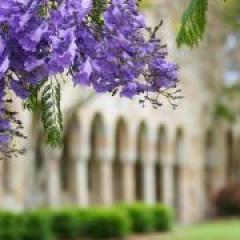A genetic reinvestigation of Cape York's Aboriginal past
Sally Wasef¹, Michael C. Westaway² & Jason Kariwiga² ³
Abstract
While across the globe the integration of genomics with archaeological investigations is producing important new insights into the past, Australia has lagged behind in initiating such collaborative research. The reasons are closely aligned with the disturbance of Aboriginal ancestral remain in the past, and the initial cavalier approach to DNA research by international scholars. The intellectual landscape is changing, and through collaborative research with Aboriginal communities and the development of strong partnerships there is much potential to investigate old questions in archaeology through a new lens. In this paper we review the question relating to diffusion of culture and genes from the Torres Strait and Papua New Guinea into Cape York following from the completion of our Cape York ARC linkage project.
About the presenters
 Dr Sally Wasef is a female early career researcher in the exciting but male-dominated field of Paleogenetics. She has focused on addressing fundamental questions about human evolution and migration using newly developed ancient DNA (aDNA) tools and bioinformatic methods. Currently, she is in her first independent, group leading position with a research affiliation to the Australian Research Centre for Human Evolution (ARCHE), Griffith University. Over her 13 years of experience, including a PhD conferred in 2016, she has obtained internationally significant results by retrieving aDNA from Egyptian mummies, Southeast Asian, Papuan and Australian humans, as well as from animal remains from sub-optimal (arid, humid tropical) environments. These research breakthroughs required significant investments of time and effort to rework currently available methods and devise new means of capturing the surviving genetic material. In leading this research, she has developed close collaborations with Traditional Owners (Gimuy Yidniji Elders, Barkandji/Paakantyi Elders, Ngiyampaa Elders, Mutthi Mutthi Elders, Thanynakwith Elders, Flinders and Howick Islands Elders among other communities), archaeologists, and other researchers from diverse disciplines within Australia and internationally. She will highlight some of the aDNA research work in Cape York. A/Prof Michael Westaway is an archaeologist and biological anthropologist funded to investigate socio-economic change in Sahul during the Holocene. He is currently undertaking a Future Fellowship in Archaeology, the School of Social Science. He will contribute today to some results of an ARC linkage project that he led while at Griffith University which has resulted in an ongoing research collaboration with Traditional Owners from the Flinders Island group. Jason Kariwiga is a PhD candidate at UQ in the School of Social Science.
Dr Sally Wasef is a female early career researcher in the exciting but male-dominated field of Paleogenetics. She has focused on addressing fundamental questions about human evolution and migration using newly developed ancient DNA (aDNA) tools and bioinformatic methods. Currently, she is in her first independent, group leading position with a research affiliation to the Australian Research Centre for Human Evolution (ARCHE), Griffith University. Over her 13 years of experience, including a PhD conferred in 2016, she has obtained internationally significant results by retrieving aDNA from Egyptian mummies, Southeast Asian, Papuan and Australian humans, as well as from animal remains from sub-optimal (arid, humid tropical) environments. These research breakthroughs required significant investments of time and effort to rework currently available methods and devise new means of capturing the surviving genetic material. In leading this research, she has developed close collaborations with Traditional Owners (Gimuy Yidniji Elders, Barkandji/Paakantyi Elders, Ngiyampaa Elders, Mutthi Mutthi Elders, Thanynakwith Elders, Flinders and Howick Islands Elders among other communities), archaeologists, and other researchers from diverse disciplines within Australia and internationally. She will highlight some of the aDNA research work in Cape York. A/Prof Michael Westaway is an archaeologist and biological anthropologist funded to investigate socio-economic change in Sahul during the Holocene. He is currently undertaking a Future Fellowship in Archaeology, the School of Social Science. He will contribute today to some results of an ARC linkage project that he led while at Griffith University which has resulted in an ongoing research collaboration with Traditional Owners from the Flinders Island group. Jason Kariwiga is a PhD candidate at UQ in the School of Social Science.
For those who will be attending in person on campus, please be aware that we are still operating under Covid-19 regulations during public events. You will be asked to check in via QR code as a condition of entry. Those who are feeling unwell, who have travelled in from overseas or a Covid-19 hotspot in the last 14 days or have been in contact with Covid-19 positive persons, are asked not to attend the seminar. Hand sanitizers will be provided for attendee use at venue.
About Archaeology Working Papers
The Working Papers in Archaeology seminar series provides a forum for dissemination of archaeological research and ideas amongst UQ archaeology students and staff. All students are invited to attend the series and postgraduate students, from honours upwards, are invited to present their research. The aim is to provide opportunities for students, staff and those from outside UQ, to present and discuss their work in an informal environment. It is hoped that anyone interested in current archaeological directions, both within and outside the School and University, will be able to attend and contribute to the series.
2025 Upcoming Sessions
| Date | Presenter |
|---|---|
| 8th August | Nicholas Hadnutt and Lincoln Morse |
| 15th August | Jane McMahon |
| 22nd August | Martin Gibbs |
| 29th August | Karen Cooke |
| 5th September | Shoshanna Grounds |
| 12th September | Meg Walker |
| 19th September | Marc Cheeseman |
| 26th September | Ladislav Nejman |



